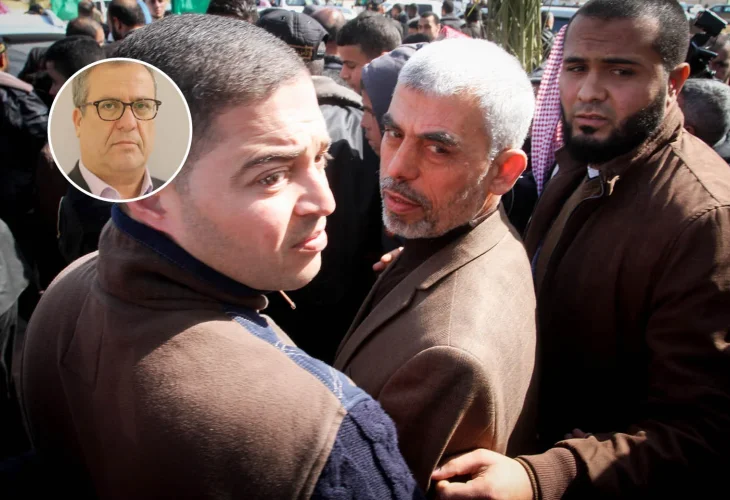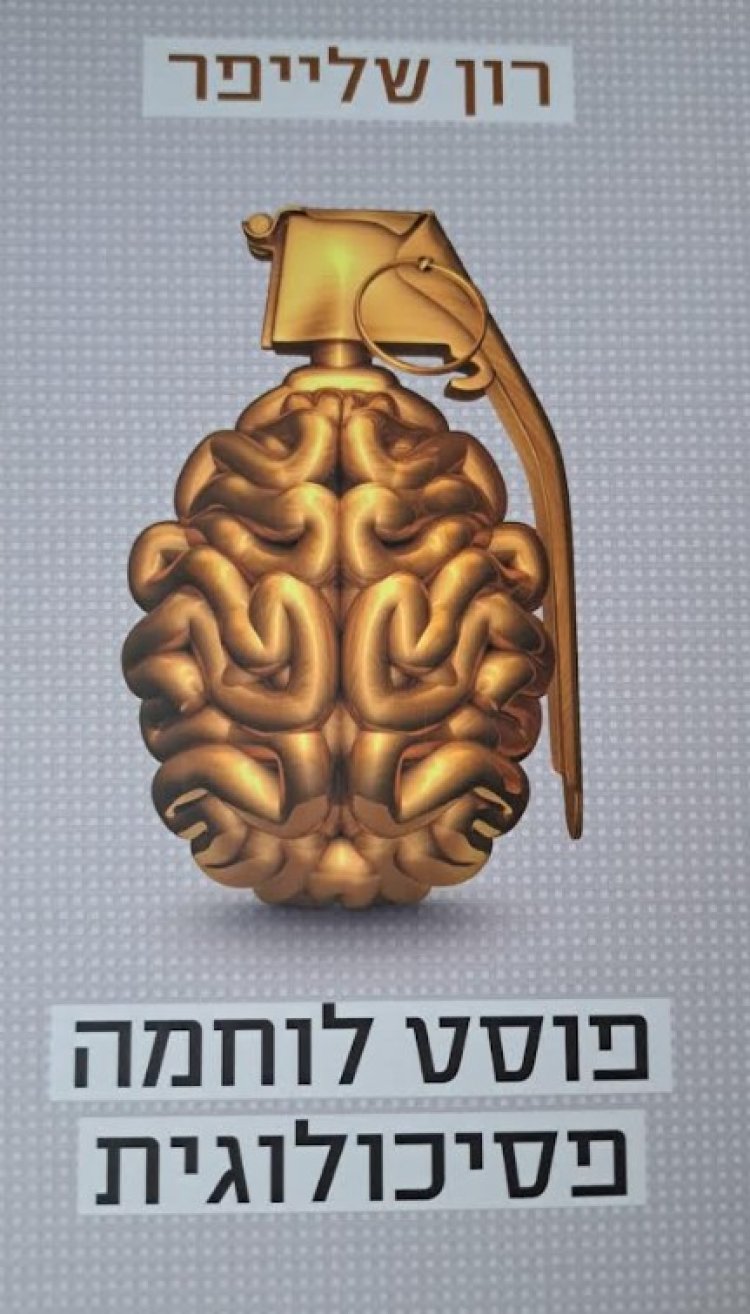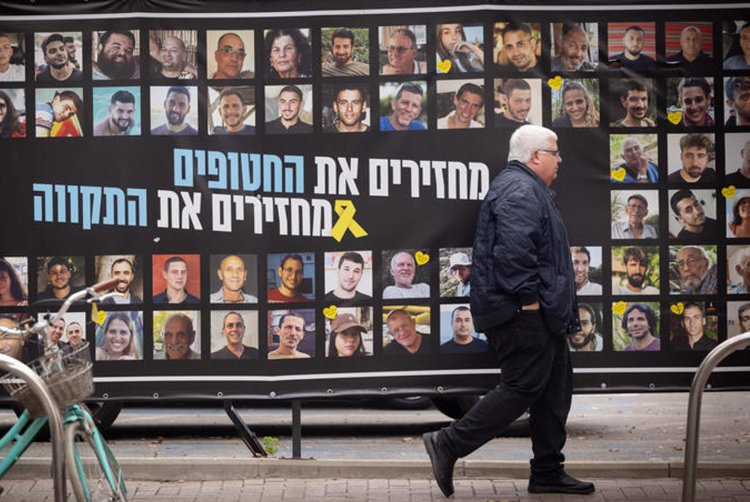How Israel Turned Hamas' Sinwar into an Arab World Hero
Psychological warfare expert Dr. Ron Schleifer discusses Hamas’ tactics with Israeli hostages, Israel's narrative battle, and the cultural missteps implicating their strategy.
 Yahya Sinwar (Photo: Abed Rahim Khatib / Flash90), inset: Dr. Ron Schleifer
Yahya Sinwar (Photo: Abed Rahim Khatib / Flash90), inset: Dr. Ron SchleiferThe Israeli hostages walked towards a white Red Cross vehicle at two different points in the Gaza Strip, watched by cheering Gazans. They appeared smiling and joyful. In the background stood armed Hamas members, 'guarding' the hostages on their way to the Red Cross personnel who awaited them. This was followed by a cynical signing of 'release' documents and a mocking distribution of a bag with 'mementos from captivity' to the unfortunate hostages. Only afterward were the hostages returned to Israel, marking one of the most emotional and complex moments in nearly a year and a half of harsh warfare against Hamas’ brutal terrorism.
These images were broadcast globally, repeatedly. Hamas’ media department later released a video summarizing these moments of release. How crucial were these images for the terror organization? For Hamas, it was a notable achievement in the psychological battle it's waging against Israel. It showcased the hostages smiling, seemingly well-treated under Hamas’ care. Perhaps more importantly, it exhibited control over the territory and the Gazan crowd around them.
Dr. Ron Schleifer, a senior lecturer at the Communications Department at Ariel University and an expert in psychological warfare, who authored "Psychological Warfare" and "Post Psychological Warfare", has studied the realm of psychological warfare for years. He is not surprised by Hamas' astute use in this domain against Israel.
"The goal of psychological warfare is simple, to influence consciousness," Schleifer explains in an exclusive interview with Hidabroot. "Psychological warfare is a sphere of combat conducted without bullets, guns or tanks, yet its impact on the combatants should not be underestimated. Indeed, it plays an essential role in any war."

Schleifer points out, "Propaganda got a terribly negative reputation after World War II, during which the Nazis used propaganda mercilessly against the Jewish people in efforts to subjugate their own nation and cause widespread destruction. Thus, democracies remain wary of the term. Yet, non-democratic societies recognize its power and apply it expertly within their warfare. Hamas, as a terror organization, exemplifies a body heavily relying on psychological warfare against Israel."
Is Israel successful at psychological warfare against terror groups?
"In the IDF up to a year and a half ago, there was a notion that politics was not to be introduced into the military," Schleifer states. "This, as an aside, was a lie, because politics from the right side of the spectrum was not introduced, whereas leftist notions were more than welcome. Beyond this point, the stance poses a severe issue regarding managing a consciousness war against our existing enemy. It’s virtually a recipe for a consciousness defeat against an adversary whose entire form of combat is political, so much to the extent that they sacrifice their own people to win the consciousness battle waged against us."
A Tale from the Vietnam War
The roots of modern psychological warfare sprouted during the Vietnam War. "Hamas and other terror groups are essentially utilizing psychological warfare principles used by Viet Cong fighters in their conflict against the Americans during Vietnam," Schleifer explains. "In both cases, you have fighters seeking, or sought, to subdue much larger forces. Due to this, the tactics that suited the Viet Cong in those days also suit Palestinian militants today. The first to adopt the Viet Cong's psychological warfare were PLO militants, later adopted by Hamas from the PLO."
What did the psychological warfare led by Viet Cong against Americans include?
"Initially, they aimed to highlight to the world, particularly the American public, the injustice of the war led by the United States away from its homeland. Subsequently, they emphasized its futility, as they saw it. They did this by interpreting the war to the public from their perspective. For this purpose, they made substantial efforts through media outlets to reach the public and convey their worldview regarding the happenings in Vietnam."
How does Palestinian militants' warfare resemble that of the Viet Cong?
"In several respects," Schleifer says. "For instance, the Viet Cong used to inflict self-damage, bringing American media to cover the damage allegedly inflicted by the Americans on North Vietnam, lamenting alleged American 'atrocities.' This pattern was fully adopted by the PLO. When PLO militants operated out of Lebanon, they fired Katyusha rockets at Israel from within the Sabra and Shatila refugee camps. Once Israel retaliated with fire to the location of the original firing, the militants used that to bring journalists and photographers to showcase alleged Israeli 'atrocities' in attacking civilian areas within the camps.
"Hamas also employs this consciousness-based combat approach. They fire at us from civilian shelters, quickly clinging to any Israeli retaliation to display supposed injustices in our behavior towards Gaza's residents. During the current war, there was also an incident where the Islamic Jihad fired at us and struck a hospital in Gaza. The militants naturally rushed to blame Israel, although evidence later revealed the truth."
Did the Viet Cong's combat style eventually prove successful?
"Absolutely. It was a tremendous success for a rural nation against the world's most powerful country—the United States. As we know, the Americans eventually withdrew from the country, which was a monumental victory for the Viet Cong."
"Hamas Pays a Huge Price"
In an analogy to Israel's struggle against Hamas, could we say that the terror group is also winning the consciousness battle?
"There’s no doubt that Hamas succeeds in conducting a highly effective consciousness battle against us," Schleifer answers with a sigh. "However, it does this at a huge cost, with many civilians of theirs dying. For example, Hamas fires at us from populated centers, we respond back to the area, which inherently has consequences. Hamas conducts a war against us using 'human shields'. They do so by practically convincing their people through Islam, presenting them with the following thesis: It's perfectly okay for people to die in the war, as in such a case, they'd reach 'paradise'."
Is there a way to combat this?
"The most effective method to counter Hamas’s psychological warfare is to illustrate for the Palestinians the value of staying alive. We need to emphasize the religious and moral value of living according to their faith rather than dying for it. The belief amongst Palestinians that death is a supreme value enables Hamas leaders living in luxurious Arab countries to let the masses perish for them."
What, in your view, does Israel misunderstand in its consciousness battle against the Palestinians?
"The Israeli leadership truly fails to grasp the religious significance of their battle against us. Israel tried to offer them the potential of being the Singapore of the Middle East—giving them artificial islands, good employment, fishing space, and other dividends appealing to Western citizens. Yet even if Palestinians enjoy these, they mean less to them. For them, it’s a religious battle above all else."
"The issue is," Schleifer continues, "our decision makers think Palestinians are crazy individuals, instead of understanding their mindset. It must be realized that education in the Strip from a young age to 18 years old is directed towards murder and terror. This is the consciousness reality we face."
And from the Gaza Strip to Lebanon: Former Hezbollah Secretary General Hassan Nasrallah is considered a master in psychological warfare against Israel in the Arab world. What was his power's secret?
"They constructed this legend around him," Schleifer claims. "Because he lacked true military capability to destroy Israel, he talked about the human spirit. Nasrallah carried out an effective campaign considering the limited means he had. After all, he wasn't equipped with aircrafts or submarines. Instead, he orchestrated a complete psychological campaign which included a brilliant deception play showing as if he had 150,000 rockets, as seen with hindsight, untrue. Overall, in consciousness fronts, each warring side publishes information favorable to their side, including Israel. So generally, many of the claims by various factions are untrustworthy."
Schleifer proceeds, "Even we have utilized a consciousness war discussing the human spirit when resources were scarce. During and following the War of Independence, Israel led a successful consciousness campaign aimed to unify the spirit of the nation behind the fighters. We did this around the water tower at Kibbutz Be'eri and other places. At the armored corps training camp in Julis, a sign read ‘the man in the tank will win’. At Kibbutz Nir’im, the sign said, ‘It’s not the tank that wins, but the man in the tank’. This was how the citizens of the nascent state were encouraged before ‘the most powerful air force in the Middle East’ era."
 (Photo: Miriam Alster / FLASH90)
(Photo: Miriam Alster / FLASH90)Hostages as a Weapon
Amid the ongoing hostage deal, what's behind Hamas' portrayals of prisoners in captivity throughout months of war?
"These portrayals are, tragically, an exemplar of effective psychological weaponry wielded by Hamas. Stalin once said the death of one man is a tragedy, but the death of a million is a statistic. Thus, anyone seeking to influence public sentiment must showcase a single piece of the situation, and through this, impacts the entire narrative. Ultimately, how many dead bodies can fit into one frame?! The brain can’t process it. So, periodically, they present before us a solitary captive begging for rescue. This strikes a chord with Israelis, leading—so the terrorists hope—to public pressure on the Israeli government for a deal, which was ultimately reached."
The video of Sinwar's execution prompted debate about authenticity. Did Israel err in showing the terrorist leader's fate?
"In this instance, Israel made a misjudgment," Schleifer states firmly. "Sinwar’s execution had two main intended audiences. First were Gaza's residents alongside Hamas militants and the Arab world. But it was also meant for Israeli citizens back home, emphasizing the justice and importance of this war, for which we've paid a dear price. Thus, the image of Sinwar lying dead surrounded by IDF soldiers was impactful for unsettling Palestinian and Arab public opinion. It was a picture of humiliation, their leader laying at the feet of Israeli soldiers, dead and dusty in a crumbling house.
"Subsequent to this, Israel displayed new footage from a drone, showing Sinwar in his final moments. The Hamas leader who ordered the massacre is seen throwing a stick at the drone, filming inside the house to rule out armed presence. This image sparked natural mockery in Israel. Obviously, a drone won’t be harmed by a stick thrown by the arch-terrorist, and even if it did—the soldiers outside were ready to terminate him. For Western eyes, this incident symbolized his utter degradation.
"However, from the Arab world’s viewpoint, the received image was entirely different. In the Arab world, value is placed on fighting until the bitter end. Since the publication of the footage, Sinwar became a heroic figure battling till his last breath, not relinquishing even with only a stick. In this way, the IDF spokesperson made a mistake by releasing this footage. Whoever decided to issue it likely saw it as a pathetic gesture by Sinwar, misunderstood entirely by the Arab world’s perspective. There was blatant misunderstanding of the Arab culture—an essential requirement for conducting effective psychological warfare."
What should have been done instead?
"In situations like these, there’s an inherent issue in psychological warfare, in that it targets both your people, whose support you seek for the war, and the other side where the anticipated result should differ, aimed at dissuading them from supporting the war. Here, we sought to show our heroism in defeating the monster, but to the Arab world, we constructed the opposite narrative."
In his conclusion, Schleifer emphasizes that despite everything, Sinwar’s elimination proved highly effective as psychological warfare: "Once terrorists saw Sinwar dead, they surrendered in Jabalia, where Israeli forces were fighting against them at the same time. Because, in the end, any regime relies on psychology."
Amidst these events, there's a unit focused on consciousness warfare in the Arab world: the IDF’s Arabic-speaking spokesperson. What score would you give them?
"The IDF’s spokesperson in the Arab world does excellent work," says Schleifer. "In my opinion, they should hold a more significant role within the IDF's media division. They deserve a standing similar to the main IDF spokesperson, Daniel Hagari, not beneath, significantly beneath as they are today. The IDF spokesperson’s office priorities should change."

